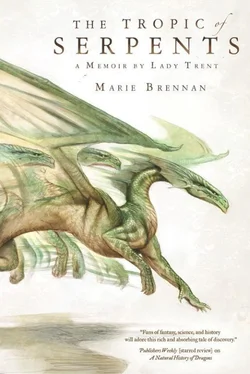By far my best experience was with the Vidwathi chemist Guhathalakar, though not, at least initially, for any reason useful to our investigation. He was a younger man than the others, thirty at most, and of a type I have met countless times in my life, which I confess is one of my favourites: so powerfully interested in his subject that trivial considerations such as the sex of his conversational partner are quickly forgotten. I might have been an orang-outang, for all he cared; what mattered was that I showed an interest in chemistry, and could respond to his statements with intelligent questions (even if I did not understand the answers). It took no encouragement at all to get him expounding at length, his voice growing louder in his enthusiasm.
It took only slightly more encouragement to steer his exposition in the desired direction. “Dragonbone, yes,” he said, his Vidwathi accent thickening as his mind raced ahead of his Scirling. “I think it is on the anvil. With so many working on the problem, and the new equipments we have now, we will have answers soon.”
He showed no sign of secret knowledge, no coy hint that he knew more than he said. Even as I responded, I transferred my attention to the milling guests around us. Guhathalakar’s voice carried well enough that soon the entire room would know we were discussing the preservation of dragonbone. “It would be a tremendous breakthrough, if so. But I confess myself troubled as to the potential consequences, once the problem has been solved. My own interest being in natural history, I cannot be easy with anything that might encourage men to butcher dragons.”
An indulgent chuckle from my left heralded the arrival of Peter Gilmartin, marquess of Canlan and vice president of the Philosophers’ Colloquium. “But did your own party not butcher a dragon for study in Vystrana, Mrs. Camherst? Indeed, I believe the drawings of that carcass were your own work. Surely it would be beneficial if natural historians could keep dragon skeletons for study, rather than having to obtain a fresh specimen each time they have a new question.”
His words were sensible, but his patronizing tone ruffled my feathers the wrong way. Still, deference for his rank forced me to moderate the reply I wanted to make. “It is not natural historians who concern me, my lord, but others, who would likely not be satisfied with a handful of skeletons. Humanity is not known for its moderation.”
“And yet, think of the advances that might come from this discovery. Should we put the well-being of savage beasts above our own?”
I had an entire article’s worth of reply ready for that, but Lord Canlan gave me no chance to begin. He turned instead to Guhathalakar, leaning forward with a friendly and conspiratorial air. “I should like to talk with you tomorrow, when we are in more scholarly surroundings. Your work interests me a great deal, and I believe I may be in a position to help it along.”
Had a Vystrani rock-wyrm breathed on me in that moment, I would not have been more frozen. While Guhathalakar made his reply, my gaze was pinned to Lord Canlan, unblinking, as if by sheer intensity of stare I could prove or disprove the sudden suspicion in my mind.
The marquess was in no position to exploit Kemble’s research himself; his primary interest was in astronomy. But that did not mean he could not benefit in other ways. For example, by selling Kemble’s notes to the highest bidder.
Did I imagine it? Was the smile he directed at me before moving onward merely more patronizing courtesy, or did it send a private, gloating message that he had what I had lost, and intended to profit thereby?
He was a marquess, above even Lord Hilford’s elevated station. I could hardly accuse him where he stood—though shock nearly overrode my better judgment and sent the words flying out by reflex. And he had said nothing I could even begin to construe as evidence, let alone expect anyone else to accept.
I fulminated on this through dinner, for there was no opportunity to step aside with any of my own friends and give them my suspicions. Afterward, though, while Lord Hilford was bidding his guests farewell, I pulled Mr. Wilker into a corner and delivered the tale in a rush.
“It’s a thin reed,” he said when I was done, and frowned across the room at where Lord Canlan stood.
Although the words of his reply were scarcely encouraging, I took heart from them nevertheless. There was a time when Thomas Wilker would have scoffed at my fears and chalked them up to an overactive imagination. Now he gave them due thought—even if that thought did not lead him to agree.
“I don’t know how he would have learned about Kemble’s research,” I admitted. “But you have met him before—is he the sort of man who would flaunt his coup in front of me like that?”
Mr. Wilker’s grimace gave me my answer. “When it is the project of a woman and a man like me… then yes. He loves nothing more than to put his lessers in their place.”
An unpleasant personality hardly constituted proof, though. “Will you be at the dinner tomorrow night?” Mr. Wilker shook his head, mouth set in a hard line. Of course not: his sex might grant him entrance to the Colloquium’s premises, but the son of a Niddey quarryman would not be invited to their celebratory meal. “Lord Hilford will have to watch, then. Lord Canlan may be offering the notes for sale, or at least sounding out his prospective buyers. Given how chatty Guhathalakar is, it won’t be difficult to encourage him to say.”
A muscle tensed in Mr. Wilker’s jaw. “It doesn’t offer very good odds for stopping him, though. We can’t ask Lord Hilford to make a scene.”
“It’s the best we can do for now,” I said. And left unspoken the rest of my thought: that we might not have any chance to do better.
Farewell to Jacob—My brother-in-law—Lord Denbow is distraught—Natalie’s escape—Scene at the docks—A woman’s wishes
I can only blame myself for the incident that occurred prior to my departure from Scirland.
The rush to depart left me with several dozen matters to take care of, ranging from soothing family to receiving Lord Hilford’s report on the final dinner of the symposium. (He did indeed question Guhathalakar, but to no avail; Lord Canlan had ignored the man all night, much to Guhathalakar’s disappointment.) One matter in particular had me more distracted than most.
On the afternoon before my departure, Mrs. Hunstin, the nanny, brought my son downstairs to await his uncle and his aunt, who would be caring for him in my absence. Jacob was dressed in a toddler’s tunic, but his hair, a sandy shade that had not yet darkened to his father’s rich brown, was presently bare of the cap clutched in his free hand. The other was clinging tightly to the nanny’s thumb, his eyes fixed on the staircase, which he descended one careful step at a time.
My mother had accused me of heartlessness, abandoning him to go gallivanting (her word) off to foreign parts. Her accusation was only the first of many, as that judgment eventually spread not only to others in our social circle, but to complete strangers and even the news-sheets. There is no reason anyone should believe me, justifying my behaviour at so late a date, but since I cannot move on without addressing this subject, let me say: a pang went through my heart at the sight of my son.
I had not been close to him during his rearing; he was not a fixture of my life the way children are for more involved mothers. I found more satisfaction in scholarly work than in the day-to-day tasks of feeding, cleaning, and comforting him. In hindsight, a part of me does regret missing such events—but even then, my regret is an intellectual one. The development of children from soft, formless infants into adults is a complex process, and one I have come to appreciate on account of my dragon studies. (If you read that comparison as demeaning, please understand that, for me, it is not. We, too, are animals: the most wondrous and fascinating animals of all.)
Читать дальше












